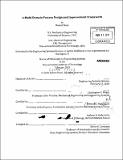A multi-domain process design and improvement framework
Author(s)
Nicol, Robert A. (Robert Arthur), 1969-
DownloadFull printable version (71.30Mb)
Other Contributors
Massachusetts Institute of Technology. Engineering Systems Division.
Advisor
Christopher L. Magee and Deborah J. Nightingale.
Terms of use
Metadata
Show full item recordAbstract
Processes in manufacturing, services, and healthcare are complex socio-technical systems composed of intricately sequenced activities supported by elements drawn from multiple domains. While many of these processes offer high performance, their complexity can make their design, improvement, troubleshooting, and change difficult due to the many possible and unforeseen interactions between elements. This thesis develops a design methodology and multi-domain network model for complex process design, change management, process improvement, and troubleshooting. As part of the methodology a feasibility analysis method based on solving the minimum cost flow problem for a network of process alternatives is presented to identify feasible processes subject to stakeholder requirements and constraints including performance, flexibility, modularity, and other system properties. A model based on Multi-Domain Matrix (MDM) concepts is developed specifically for process analysis called the Multi-Domain Process Matrix model (MDPM) to enumerate and analyze the interactions between process elements such that process performance under change and troubleshooting scenarios can be improved. The graph theory basis of the MDPM model enables its analysis using a proposed set of metrics derived from communications, social, and process network literature. As a demonstration of the use of the methodology, a complex DNA sequencing based surveillance process for Methicillin resistant Staphylococcus aureus (MRSA) in the US healthcare system is designed and a prototype implemented. Rapid advances in DNA-based technologies have greatly expanded the range of processes available to the clinical microbiology laboratory, however, integrating these new processes into a comprehensive surveillance system presents significant challenges. Many of these new technologies are still in early stages of development, require multidisciplinary teams to support them, and must undergo significant optimization presenting significant barriers to their rapid adoption despite the pressing need to understand and control antibiotic resistance. Data from the prototype MRSA surveillance process show significant variation at the DNA level between patient cases, providing evidence for the urgent need for a DNA sequencing based microbial surveillance process as part of clinical microbiology efforts in the US healthcare system. However, results of applying the process design methodology and MDPM model analysis indicate significant work remains to reduce complexity, further improve key technology elements, gain acceptance, develop key organizational infrastructure, and Page 3 of 385 redesign the process to efficiently absorb the rapid technology change expected in DNA sequencing. The MDPM model is used to develop a roadmap of specific multi-domain projects addressing these issues to accelerate the deployment of a national DNA sequencing based surveillance system.
Description
Thesis (Ph. D.)--Massachusetts Institute of Technology, Engineering Systems Division, 2010. Cataloged from PDF version of thesis. Includes bibliographical references (p. 379-385).
Date issued
2010Department
Massachusetts Institute of Technology. Engineering Systems DivisionPublisher
Massachusetts Institute of Technology
Keywords
Engineering Systems Division.